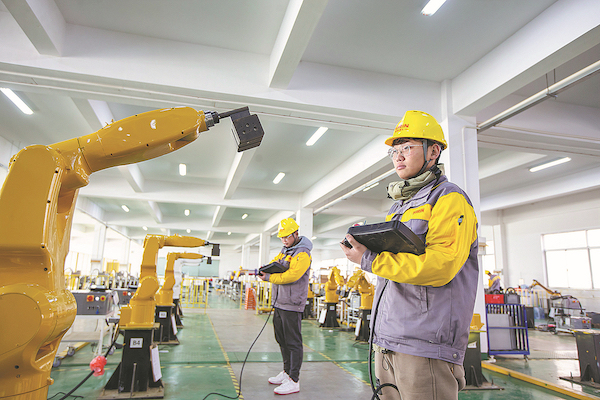
- Home
- Media Center
-
Events
- Wuzhen Summit
- Regional Forums
- Practice Cases of Jointly Building a Community with a Shared Future in Cyberspace
- World Internet Conference Awards for Pioneering Science and Technology
- The Light of Internet Expo
- Straight to Wuzhen Competition
- Global Youth Leadership Program
- WIC Distinguished Contribution Award
- Membership
- Research & Cooperation
- Digital Academy
-
Reports
- Collection of cases on Jointly Building a Community with a Shared Future in Cyberspace
- Collection of Shortlisted Achievements of World Internet Conference Awards for Pioneering Science and Technology
- Reports on Artificial Intelligence
- Reports on Cross—Border E—Commerce
- Reports on Data
- Outcomes of Think Tank Cooperation Program
- Series on Sovereignty in Cyberspace Theory and Practice
- Other Achievements
- About WIC
- 中文 | EN

China shoots to fifth place in robot density rankings

Technicians check industrial robots at a manufacturer in Haian, Jiangsu province. [ZHAI HUIYONG/FOR CHINA DAILY]
China's massive investment in industrial robotics has put the country higher in global rankings in terms of robot density, surpassing the United States for the first time and marking a significant improvement in the country's industrial automation level, an industry report said.
Experts said research and development, manufacturing and application of robots have been used as indicators to gauge a country's scientific and technological innovation and high-end manufacturing level. China's burgeoning robotics industry is playing an increasingly important role in speeding up the intelligent transformation of the manufacturing sector.
China is by far the fastest-growing robot market in the world, with the highest number of annual installations, and it has had the largest operational stock of robots each year since 2016, according to the World Robotics 2022 Report, released by the International Federation of Robotics.
The number of operational industrial robots relative to the number of workers hit 322 units per 10,000 employees in China's manufacturing industry last year, ranking fifth across the globe, the report said.
"Robot density is a key indicator of automation adoption in the manufacturing industry around the world," said Marina Bill, president of the IFR. "The new average of global robot density in the manufacturing industry surged to 141 robots per 10,000 employees, more than double the number six years ago."
China's rapid growth shows the power of its investment so far, but it still has much space to automate, Bill said. In 2021, the world's top five most automated countries in manufacturing were South Korea, Singapore, Japan, Germany and China.
Meanwhile, robot density in the US rose from 255 units in 2020 to 274 units in 2021, and the country ranks ninth in the world, down from seventh.
The report to the 20th National Congress of the Communist Party of China stated innovation will remain at the heart of China's modernization drive, and the country will accelerate the implementation of its innovation-driven development strategy to achieve greater self-reliance and strength in science and technology.
As one of China's strategic emerging industries, the robotics sector has made remarkable achievements in recent years. Data from the National Bureau of Statistics showed the output of China's industrial robots hit a record 366,000 units in 2021, surging 68 percent year-on-year.
"Robots are the key equipment to achieve intelligent manufacturing, and have become an increasingly indispensable part in smart factories," said Tao Yong, a professor of robotics at Beihang University in Beijing, adding that the world's major developed countries have stepped up the push for R&D of core technologies related to high-end robots.
Tao said robots are playing a critical role in driving the intelligent transformation and upgrading of the traditional manufacturing industry. For instance, an increasing number of companies are applying industrial robots to boost operational reliability and reduce costs.
Efforts should be made to achieve breakthroughs in core and key technologies, such as intelligent perception, human-machine interaction and robotics programming and simulation, give full play to enterprises' leading role to promote the industrial use of robots, and strengthen the coordinated development of robotic industrial and supply chains, he said.
According to the Chinese Institute of Electronics, the country's robotics market is expected to reach $17.4 billion in 2022, with a five-year average annual growth rate of 22 percent. The country's industrial robot market is projected to be valued at $8.7 billion by the end of this year.
Song Xiaogang, executive director and secretary-general of the China Robot Industry Alliance, said robots serve as indispensable and significant equipment to bolster industrial automation, digitalization and intelligence, and could be widely applied in high-end manufacturing.

The World Internet Conference (WIC) was established as an international organization on July 12, 2022, headquartered in Beijing, China. It was jointly initiated by Global System for Mobile Communication Association (GSMA), National Computer Network Emergency Response Technical Team/Coordination Center of China (CNCERT), China Internet Network Information Center (CNNIC), Alibaba Group, Tencent, and Zhijiang Lab.





